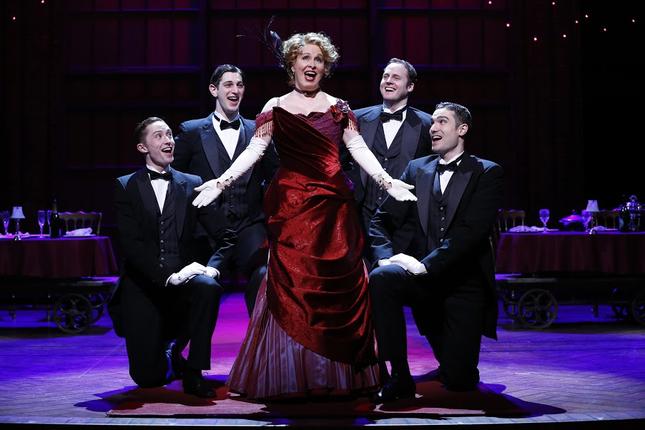‘Hello, Dolly!’ Now at Ford’s Theatre
By • April 18, 2013 0 1201

The Eric Schaeffer-directed production of “Hello, Dolly!,” now at the Ford’s Theatre through May 18 is a kind of disguised version of the mega-hit, legendary Broadway musical which opened on Broadway in 1964.
I don’t mean to suggest that audiences aren’t getting their money’s worth with this production, a coproduction of Ford’s and Signature Theaters or that it’s a knock-down and knock-off version of the original and everything else that followed in revivals and road shows. In fact, you could argue that you’re getting more of two plays in one as opposed to the diva- and spectacle-driven original versions.
This production arrives like the latest, if not last, piece in a string of serendipity. “Hello, Dolly!” is derived from a drama by Thornton Wilder (whose “Our Town” already graced Ford’s Theatre this season), which he derived himself from his flopped play “The Merchant of Yonkers,” which was in turn derived from an 1835 English play, called “A Day Well Spent” by a gentleman named John Oxenford, which was adapted into a farce called “Einen Jux Will Er Sich Machen” by Johann Nestroy, from which Wilder got “The Merchant of Yonkers,” which became “The Matchmaker” (which was presented at Ford’s Theatre several years ago), which became “Hello, Dolly!” So, we can say today, “Hello, Dolly!”
Nonetheless, it’s still the same old story—and song and dance–about the adventures and misadventures and yearnings of a matchmaker-widow who still loves her late husband and can do just about everything except perhaps change a tire, a rich widower merchant in search of a compliant wife, his daughter who is in love with an artist, his two over-worked, under-paid clerks out in the wilds of upscale night life New York in search of adventure and, maybe, love and a dressmaker and shopkeeper with her high-energy assistant.
All these folks—prodded along by the wily machinations of the life-force that is Dolly Levi, once a legendary mover and shaker and connector in New York, where the waiters at the pricey Harmonia Gardens still remember her—bump into each other, do something brave and daring and life-changing. Dolly herself—all the while asking her late husband for forgiveness—is seeking to land the big whale, the merchant Horace Vandergelder by acting as a matchmaker for him.
What’s also there is Jerry Herman, his music, his songs, his lyrics. “Hello, Dolly!” is still there, still an anthem, but somehow, less of a national anthem, more of a local anthem, the locale being home plate disguised as the big heart of Dolly outbeating everyone else’s. We’ve got a polka, Horace’s anthem about the uses of a wife, “It Takes a Woman,” dressmaker Irene Molloy’s song to what she does “Ribbons Down My Back,” and the dancing waiters and a number called “Dancing.” In some ways, this has always been Herman at his warmest—he is the genius of creating music for divas and his biggest hits, “Dolly,” “Mame” and “La Cage Aux Folles” are diva-driven.
“Hello Dolly!” doesn’t come until a bit into the second act, but more characteristic of what Schaeffer is up to is the closing number of Act One, “Before the Parade Passes,” a piquant, clear-eyed song which Nancy Opel delivers with a knowing, straight-to-the-heart openness.
Her delivery, her way of moving in Dolly’s billowing wake seems to me not to echo so much the blot-out-the-sun star turns of the likes of Carol Channing (three times) or la Streisand who did not leave much room for anybody else in the film version. Rather, she echos Wilder’s original play which starred a younger Ruth Gordon. “The Matchmaker” didn’t need an exclamation point and neither does Opel. This is the chief virtue of this production—you get the expected goodies—even if scaled down—while the play opens up the give us a closer look at the other folks.
Which leaves Ed Gero with half-hearted bluster as Vandergelder, succumbing almost as if he knew he would, the sudden daring of clerk Cornelius played nimbly and in spirited fashion by Craig Meheu, the attractive solidity of Tracy Lynn Olivera as Irene Molloy.
Dolly lives in a world, a full and rich one richly staged here—and she knows every inch of it. Her deliverance unto and into the world of Vandergelder will no doubt transform it. Opel, in her way as Dolly, lets you see that this is still Wilder’s play as much as it is Herman’s show.

